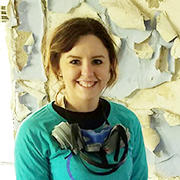
This summer, thanks to several generous gifts in support of Dean David N. Hempton’s campaign initiatives, HDS continued its ongoing effort to provide students with financial support so that they can serve communities locally and abroad through organizations unable to offer paid summer experiences.
The Dean’s Summer Internship Awards are $5,000 stipends that enable several MTS students to make positive contributions through internships with nonprofit or public service organizations, and then take those experiences with them back into the classroom in the fall.
Below, one of the award recipients, Ashlynn Rickord, explains in her own words how the stipend allowed her to work for Waltham Historical Commission in Waltham, Massachusetts, and the impact her internship is having on the community and herself.
♦♦♦
Thanks to the Dean's Summer Internship Award, my background in history, and my somewhat quirky interests in the connection between religion and institutionalization, I had the chance of a lifetime to research the history of the Walter E. Fernald Developmental Center in Waltham, Massachusetts.
The history of the Fernald Developmental Center stretches back over 150 years, having opened its doors in Boston in 1848. The Fernald is the oldest institution in the Western Hemisphere for the treatment of the developmentally disabled, and due to its many influential leaders, it was a hotbed of progress in the study of disabilities.
After lengthy court battles in its final few decades, the once thriving institution closed for good in late 2014. Although the campus is now closed, its memories live on in those that once lived, worked, and experienced the Fernald. My work this summer was to bring light to those stories and the property’s history.
With the support and assistance of my supervisor, Alex Green, I had the opportunity to delve into the underbelly of Boston area archives to piece together the long history of the Fernald, especially its religious life. One of my main objectives for the summer was to understand what the religious life was like at the property, and how local religious communities viewed the residents of the school.
To answer these questions, I searched far and wide in many archives and libraries, such as the Massachusetts Archives, Brandeis University archives, the Waltham Public Library, the Congregational Library & Archives, the Boston Public Library, Harvard Medical School, Schlesinger Library, and the Roman Catholic Archdiocese of Boston archives, just to name a few. By surveying these resources, I was able to conclude that religion was an integral piece to the life of residents at the Fernald, and equally able to begin to understand how and why.
Aside from historical research, I completed oral history interviews with former chaplains of the school, and with two community members who attended services regularly and who were siblings of a patient at the Fernald. Their insights into a typical service made me wish I had been around to attend Mass at the Chapel of the Holy Innocents when it was still in operation.
I also had the chance to learn about public policy and how city governments function. As the Fernald now sits vacant, the city and its stakeholders are in conversation about what to do with the 198-acre property and its nearly 100 buildings still standing. Having attended public input meetings, city council meetings and the like, I had a glimpse into the complexity of public policy issues, especially when working with varying responses from interested parties.
Lastly, I was exposed to some issues related to historic preservation, specifically looking at building conditions around the campus to determine their possibility of reuse in future redevelopment.
Each and every task completed for my internship helped build my professional skills and solidify my career goals moving forward. I also had an intense interest in how religious groups interacted with institutions for the mentally ill/developmentally disabled, and from my summer work, I have a perfect case study for answering my continual research question.
This internship also allowed me to build a strong network of connections within the fields of research, archives, public policy, and historic preservation—a significant advantage in my future career path.
As I look toward my second year at HDS, I have a clear mission on how to continue to expand my knowledge base in the discussion of religion and institutionalization. I hope to continue this kind of work with the Fernald and other institutions, to highlight these wonderful, yet slowly becoming forgotten histories.
Special thanks to Alex Green for all of his leadership and support as my supervisor, to the Waltham Historical Commission for hosting me, and to all the archival and library staff that assisted me with my research. And of course, a huge thank you to Harvard Divinity School and Dean David N. Hempton for sponsoring this program and providing me with the chance to complete this work that helps me grow both professionally and personally.
—Ashlynn Rickord is a master of theological studies degree candidate at HDS
